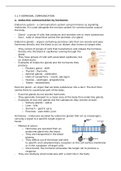Summary
Summary 5.1.4 Hormonal Communication Revision Notes (OCR A)
Comprehensive study guide for Biology A Level, made by an Oxford Biochemistry student with all 9s at GCSE and 3 A*s at A Level! Information arranged by spec point. Concise notes written using past papers, multiple textbooks, class notes and more.
[Show more]




